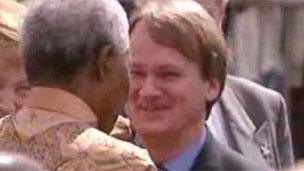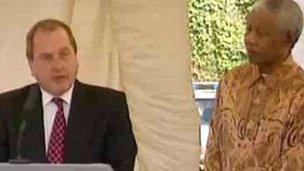Nelson Mandela death: Tributes from around Wales
- Published
Friend of Nelson Mandela Peter Hain said his legacy was a peaceful nation
Tributes have been paid across Wales to Nelson Mandela, who has died age 95.
First Minister Carwyn Jones said his "message of forgiveness, of reconciliation for the sake of a better future is one all of us should follow".
Welsh Conservatives leader Andrew RT Davies called Mandela a "global inspiration". Plaid Cymru leader Leanne Wood said the "world today mourns a great man".
And Welsh Liberal Democrat leader Kirsty Williams said Mandela personified the "struggle for freedom and equality for all".
Race Council Cymru chief executive Uzo Iwobi said there was "no tribute more fitting to his memory than to continue his lifelong commitment to ending oppression".
Rugby writer Peter Jackson, who covered the 1995 Rugby World Cup in South Africa, said Mandela had a "colossal, galvanising effect" on Springbok's winning the tournament due to his "charisma and saintliness"
CARWYN JONES AM, First Minister
"Nelson Mandela can be truly described as one of the greatest figures of modern times. Not many people can claim to have changed the history of their nation for the better, by bringing together what was then a bitterly divided society.
Carwyn Jones said Nelson Mandela had a great affinity for Wales
"His message of forgiveness, of reconciliation for the sake of a better future is one all of us should follow. He described himself as an ordinary man, but he represented the best of humankind and he will be greatly missed.
"In Wales, we had a proud record of opposing apartheid. I remember in the 1980s when I was a student, taking part in the anti-apartheid protests whilst all over the country schools, councils, universities, the Welsh Rugby Union and others all played their small part in opposing such an inhuman regime. When President Mandela visited Wales in 1998, he thanked the Welsh people for their support - it was a moment we will never forget."
ANDREW RT DAVIES AM, Leader of the Welsh Conservatives
"Nelson Mandela was - and always will be - a global inspiration.
"His was a life that has defined what it means to be truly great.
"His tremendous will, incredible humility, and resolute commitment to democracy, justice and freedom have transformed history and changed the world.
"More than an international icon, more than an enduring legacy; Nelson Mandela's name and actions will forever be etched in our history.
"His spirit, integrity and humility have inspired me, as I know they have many more across Wales - and all over the world."
LEANNE WOOD AM, Plaid Cymru leader
"The world today mourns a great man who has inspired generations and whose achievements will last forever.
"Very few people succeed in bringing about truly significant change in their lifetime. Nelson Mandela certainly was one of those individuals and the legacy of his achievements will live on in South Africa and throughout the world.
"The people of Wales can be proud of having stood in solidarity with Nelson Mandela in his struggle against apartheid, something that he recognised upon his visit to Wales in 1998 when he was granted the freedom of Cardiff.
"While our thoughts are with his family at this sad time, they can take solace in the knowledge that he was a truly great man who really did change the world."
"Today we have lost not only an inspirational leader, but also a truly great man.
KIRSTY WILLIAMS AM, Welsh Liberal Democrat leader
"Nelson Mandela personifies the struggle for freedom and equality for all.
"Through his courage and perseverance he achieved what so many considered to be impossible and brought about real change. After centuries of oppression he liberated South Africa from the tyranny of racial apartheid and in doing so demonstrated to the rest of the world how to lead with compassion and grace.
"His ability to unify communities and deliver justice to a fractured and tormented state are unparalleled and his legacy will continue for generations to come."
UZO IWOBI, Race Council Cymru chief executive
"The sad passing of Nelson Mandela marks a moment for personal reflection on the huge personal impact he had on the fight to end oppression not just in his home nation of South Africa but around the world and here in Wales.
"Mr Mandela's indefatigable spirit and commitment to creating a more just, equal and fair society still has an impact in Wales today. It is now up to all of us living here to ensure his lasting legacy and there is no tribute more fitting to his memory than to continue his lifelong commitment to ending oppression.
"Race Council Cymru is steadfast in its commitment to work towards a Welsh nation that is free from prejudice and racial discrimination. We pay tribute to Mr Mandela (Madiba) and we pledge to honour the huge contribution and sacrifice he made by working to fulfill his vision of a truly equal society."
RUSSELL GOODWAY, leader of Cardiff County Council when Nelson Mandela visited the city in 1998
"The word I think is 'enchanting' He had that ability to build an immediate relationship with you.

Russell Goodway greeting Nelson Mandela
"You felt you had a connection. He immediately engaged with people. It was enchanting.
"You were really aware you were in the presence of someone who had become a symbol for peace and harmony."
"You felt like you'd been in this person's company forever. He just oozed gratitude."
He spoke to BBC Radio Wales about Mr Mandela and his visit.
Cardiff Council, which granted Mr Mandela the freedom of the city on his visit in 1998, has opened a book of condolences at City Hall.
RON DAVIES, Welsh Secretary during visit to Wales, 1998

Ron Davies with Nelson Mandela in 1998
"For me, what came over during his visit was the sheer power of him as an individual and the sheer delightful nature of his personality.
"Completely at ease with himself - no malice, no rancour, a great deal of humour.
"Politicians make speeches that are written for him..he was speaking from his heart and he knew about Wales."
MIKE MILES, Bridgend businessman who lived in South Africa under apartheid
Bridgend businessman Mike Miles lived in Africa under apartheid from 1981 until 1994 and has been returning in the years since to try to reduce the "economic apartheid" which, he says, still exists.
Businessman Mike Miles, from Bridgend, lived in South Africa from 1981 to 1994
He described his time there as surreal with a privileged white sector of swimming pools and expensive cars and the hardships of life in townships.
"I was a pink Welshman in amongst 2m black people so I stood out a bit," he told BBC Radio Wales.
"In the same day you would see the absolute best that mankind could do in terms of bravery and integrity and the absolute worst... of people and children being shot.
"The positives of mankind I saw manifested in the townships. It was quite humbling."
PETER JACKSON, rugby writer who covered the 1995 Rugby World Cup in South Africa
"I was there throughout that tournament and I remember the opening ceremony vividly in Cape Town, just before South Africa the hosts played Australia, the holders, and the president talking about 'our rainbow nation'.

Nelson Mandela presents the rugby World Cup to Springbok captain Francois Pienaar in 1995
"I doubt really if he imagined that the tournament would build up to the historic climax.
"In rugby there has never been a bigger global occasion and that final which went to extra time and the All Blacks, the favourites, were undone and yet somehow South Africa won it.
"Talking to the players afterwards it was quite clear that Mandela had had a colossal, galvanising effect on the whole thing.
"Before the game he came into the Springbok dressing room unannounced, wearing the number 6 Springbok jersey.
"What you have got to remember is pre 1995 the Springbok was seen by and large as the prancing antelope, one of the symbols of white rule.
"How the whole country was transformed and how the whole country got behind South Africa, only somebody of Mandela's charisma and saintliness could have achieved."
PETER HAIN MP, lifelong anti-apartheid activist
"Nelson Mandela's shoes were always going to be impossible to fill and none of the successors have been able to do that.
Peter Hain told Oliver Hides Mandela 'healed' a divided nation
"And then, equally, his role was to heal a bitterly divided nation as he did so momentously, captured brilliantly in Clint Eastwood film Invictus at the rugby World Cup final in Johannesburg in 1995, donning the Springbok jersey and cap, the hated symbol of apartheid.
"So for Mandela to do that was a reconciling thing which brought people together and people never looked back. That was his role. His successors have a lot to live up to."
Lord KINNOCK, former Labour leader, and Baroness KINNOCK, former Labour MEP
"Nelson Mandela was a supreme inspiration to us from the early 1960s when we first campaigned against apartheid.
"He showed unsurpassed courage and endurance in his fight against oppression, unequalled humanity in his guidance to South Africa and the world.
"He had the strength to be merciful, the wisdom to be gentle and generous. We salute those qualities of truly great leadership.
"It was a privilege to meet Mandela the hero, a delight to know Nelson the man. We cherish memories of time spent with him - and to be called 'comrade' by such a man was an unforgettable honour."
REV DR GERAINT TUDUR, leader of the Union of Welsh Independent Churches
"The black people of South Africa who suffered the brutal apartheid system would have been justified in taking revenge on their oppressors, but Mandela's amazing example averted a potentially bloody civil war."
BETTY CAMPBELL, Anti-apartheid supporter and former head teacher
Anti-apartheid supporter and retired head teacher Betty Campbell, 73, from Butetown in Cardiff was a member of the Commission for Racial Equality. She campaigned in the 1950s and eventually took her son to meet the former South African president in Cardiff.
Betty Campbell spoke to Mai Davies
"The one thing that really sticks out in my mind is he really didn't have any time for journalists, photographers or whatever and I remember he was standing on the stage and the hall was crowded.
"In front of the stage they must have been three deep and they were journalists and photographers and he would not start until he said to them, 'I did not come here to see you, I came to see the people. Please will you go back'. They had to move away. They were stunned by that.
"Generally, People who are well known like to have their pictures taken and be fussed over, but not Nelson Mandela."
DR HOWARD BARRELL, Cardiff University's South African politics academic
Former South African journalist and editor Dr Barrell, who specialises in South African politics at Cardiff University and who met Nelson Mandela, called him a paradox.
"He was a man of many contradictions. His great strength and, I think, his great power lay in his own humanity and, in many respects, in his own frailties.
"He was a paradox in many respects, an extraordinary man."
- Published6 December 2013
- Published5 December 2013
- Published6 December 2013
- Published5 December 2013